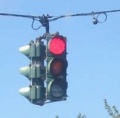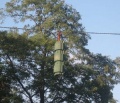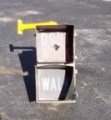Checker
Contents
Company Background
These signals are still a complete mystery to me, and no one I know in the signal business seems to know much about them. The only consensus I was able get from some of the signal contractors I know is that they are universally regarded as cheap junk.
They made a big splash around here in the late seventies, because they were way more economical to purchase at the time. (cheaper!!!). Early on, they were approved for use by IDOT, until it was discovered how poor the castings were. The paint began to fall off months after their installation. The latches broke very easily. The hinges would freeze up after one winters worth of salt, and the doors would then break off when one tried to open them. The list of complaints went on and on, and soon, their further use was discontinued. Amazingly, quite a few still remain in use throught both the Chicagoland area and parts of central Long Island, and mostly they are in very poor shape. The doors are held shut with either electrical tape, or plastic tie wraps, and often they are completely devoid of any paint, with the aluminum casting slowly oxidizing into a white powder.
It is amazing though, that no one seems to remember much about the manufacturer. The distributor in this area who sold them is long out of business, and I just haven't been able to turn up much info on them. I was told that they may have been some offshoot, or in some way tied to Singer, when they were in financial ruin in the late seventies. A friend of mine in the signal business seems to remember hearing a story that some Singer people who were about to lose their jobs decided to try marketing their own signals, and had them made cheaply somewhere out of the USA. This corroborates with a comment that Pete (RYGDWW) made that they were an "offshore" casting, and one of low quality at that. The castings are very thin.
I looked over one that I have that is in relativly good shape. I have had it for many years. It was removed shortly after it was originally installed. I cannot find any sort of identifying marks or numbers on it anywhere, other that the logo on the back. Even the rim of the lenses has no markings at all, and they are an extremely thin plastic. You could almost push your finger right through it. Even the sockets are a strange, and very flimsy design. The entire socket spins when you try to turn the bulb, and the backside must be held with the other hand to get the bulb out.
An interesting thing I discovered is that the 8" sections use the more conventional screw tab style visors, while the 12" sections use the slot style ala Singer, or D type Crouse-Hinds.
Worth noting, due to the extra aluminum used to hold the visor screws in place, many LED inserts don't quite fit in the 12" Checker.
Traffic Signals
Four Ways
As far as anyone is aware, Checker didn't make any 4-ways.
Adjustables
Checker made both 8 inch and 12 inch signals. The 8 inch signals looked similar to an Eagle Flat-back signal; however, the 12 inch signals looked more like a cross between the an Eagle Flat-back and a Crouse-hinds Type-R.
Pedestrian Signals
describe models, variations [delete]
Vehicle Heads (Round)
Vehicle Heads (Square Door Adapters)
Pedestrian/Sign Heads (Rectangular)
Informational Signals and Signs
describe models, variations [delete] includes "box signs," "case signs," and Ped Heads with special [non-ped] lenses.
Lenses
describe models, variations [delete]
Vehicular
Checkers have been known to utilize Kopp 4955 glass lenses, and poly lenses.
Pedestrian
Worded
Symbols
Special
Controllers
Different type of controllers [delete]
Hardware
this would include any kind of mounting hardware including brackets, slipfitters, hangers, bases, etc. [delete]
Restored Examples
a couple of quality pics of a restored unit [delete]












